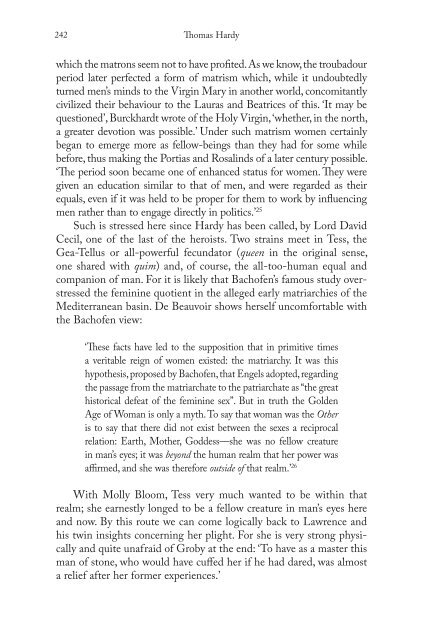Bloom's Literary Themes - ymerleksi - home
Bloom's Literary Themes - ymerleksi - home
Bloom's Literary Themes - ymerleksi - home
Create successful ePaper yourself
Turn your PDF publications into a flip-book with our unique Google optimized e-Paper software.
242<br />
Thomas Hardy<br />
which the matrons seem not to have profited. As we know, the troubadour<br />
period later perfected a form of matrism which, while it undoubtedly<br />
turned men’s minds to the Virgin Mary in another world, concomitantly<br />
civilized their behaviour to the Lauras and Beatrices of this. ‘It may be<br />
questioned’, Burckhardt wrote of the Holy Virgin, ‘whether, in the north,<br />
a greater devotion was possible.’ Under such matrism women certainly<br />
began to emerge more as fellow-beings than they had for some while<br />
before, thus making the Portias and Rosalinds of a later century possible.<br />
‘The period soon became one of enhanced status for women. They were<br />
given an education similar to that of men, and were regarded as their<br />
equals, even if it was held to be proper for them to work by influencing<br />
men rather than to engage directly in politics.’ 25<br />
Such is stressed here since Hardy has been called, by Lord David<br />
Cecil, one of the last of the heroists. Two strains meet in Tess, the<br />
Gea-Tellus or all-powerful fecundator (queen in the original sense,<br />
one shared with quim) and, of course, the all-too-human equal and<br />
companion of man. For it is likely that Bachofen’s famous study overstressed<br />
the feminine quotient in the alleged early matriarchies of the<br />
Mediterranean basin. De Beauvoir shows herself uncomfortable with<br />
the Bachofen view:<br />
‘These facts have led to the supposition that in primitive times<br />
a veritable reign of women existed: the matriarchy. It was this<br />
hypothesis, proposed by Bachofen, that Engels adopted, regarding<br />
the passage from the matriarchate to the patriarchate as “the great<br />
historical defeat of the feminine sex”. But in truth the Golden<br />
Age of Woman is only a myth. To say that woman was the Other<br />
is to say that there did not exist between the sexes a reciprocal<br />
relation: Earth, Mother, Goddess—she was no fellow creature<br />
in man’s eyes; it was beyond the human realm that her power was<br />
affirmed, and she was therefore outside of that realm.’ 26<br />
With Molly Bloom, Tess very much wanted to be within that<br />
realm; she earnestly longed to be a fellow creature in man’s eyes here<br />
and now. By this route we can come logically back to Lawrence and<br />
his twin insights concerning her plight. For she is very strong physically<br />
and quite unafraid of Groby at the end: ‘To have as a master this<br />
man of stone, who would have cuffed her if he had dared, was almost<br />
a relief after her former experiences.’
















